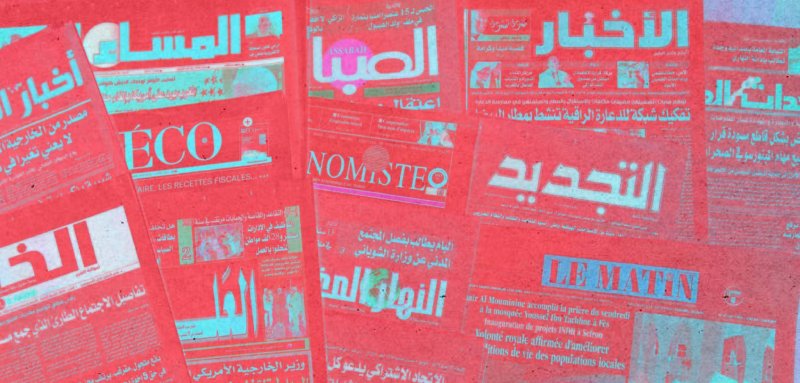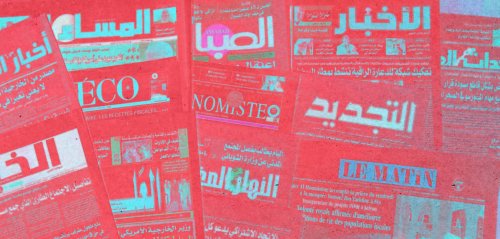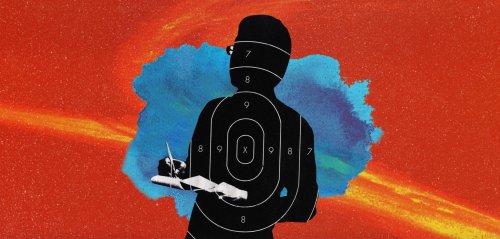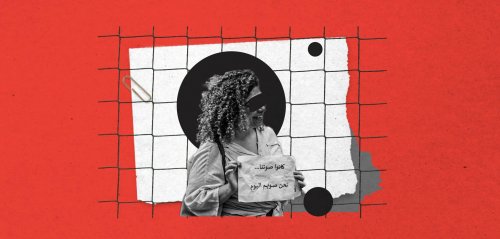“When I was studying law between 2014 and 2018, I was passionate about exploring the concept of the state, its forms, the nature of its governing systems –executive, legislative, judicial–, and the relationship between these authorities, citizens, and various actors in the political arena. I realized the importance of the press as a Fourth Estate that plays a pivotal role in nurturing and developing democracy within any country. I decided to study law with the intention of practicing it as a profession. But the shock was strong,” M. Amghnas (pseudonym) tells Raseef22, while revealing the reason for his career shift from journalism to freelance project work.
M. Amghnas, a graduate of the journalism or media department at one of the Moroccan universities, shifted his career path after being shocked by the reality of his chosen profession in Morocco. He collaborated with Raseef22 on this article, given his familiarity with the industry and the local landscape.
Students typically cultivate their passion for journalism at university, by studying its history, definition, genres, rules, ethics, professional practice, as well as examining the legal texts that frame it. They conduct research on its relationship with various scientific disciplines or other professions and its roles in public affairs.
Students graduate, armed with a wealth of knowledge, with many aspiring to practice the profession as they were taught – in accordance with its rules and within the framework of its ethics. However, the reality is different, with matters that must be investigated in order to enable the Fourth Estate to perform its duties.
Despite the presence of 367 accredited online newspapers in Morocco, the majority of journalism graduates leave the profession. Journalists are required to produce between 6 and 10 articles per day for a meager salary that doesn't cover rent or transportation
The Fourth Estate
To achieve a democratic state, it is necessary to have a free and impartial press that disseminates the truth and exercises its supervisory role as a Fourth Estate over officials in official institutions and various actors in public affairs.
The description of the press as the Fourth Estate is based on the fact that the media is the main source of information that people need to govern themselves.
The constitution of the United States only mentions one profession: journalism, with the First Amendment stating that “Congress shall make no law abridging the freedom of speech, or of the press,” as affirmed by President of the United States Joe Biden in a statement on the occasion of World Press Freedom Day in 2023.
Free press plays a crucial part in building or maintaining democracy. However, some journalists abuse and mistreat this profession, submerging it in the swamp of triviality.
The problem of triviality
Among the problems that hinder journalistic work in Morocco is the problem of triviality, which has led some citizens to dismiss certain newspapers, and prompted some officials to make statements or reveal important national data to the international press.
Among the problems that hinder journalistic work in Morocco is the problem of triviality, which has led some citizens to dismiss certain newspapers, and prompted some officials to make statements or reveal important national data to the international press.
During the celebrations that swept the nation in late 2022 following the historic achievement of the Moroccan national team in the Qatar World Cup, the online newspaper AchKayen published an article titled Abu Khalal, a Salafi Infiltrates the National Team. It was met with severe public criticism, in addition to institutional condemnation.
The issue reached the Moroccan parliament and was raised in the weekly oral question session on Monday, December 26, 2022. Abdellatif Wahbi, the Justice Minister, succinctly noted, “Not to pay attention to what the nonsense newspapers publish.”
AchKayen is not the only outlet publishing such ‘work’ that undermines and ridicules journalism as a profession. Its editor-in-chief, Hicham Al Omrani, started his career at Badil.info, the digital outlet managed by Hamid El Mahdaoui, who Al Omrani boasts having apprenticed under.
Hamid El Mahdaoui gained prominence during the social movement that took place in northern Morocco following the death of fish vendor Mohsen Fikri on November 28, 2016. He was arrested and convicted at that time on charges related to shouting in public and inciting citizens to participate in a prohibited protest, and for communicating with an individual in the Netherlands who planned to smuggle weapons into Morocco and failing to report it.
El Mahdaoui became famous in his home country for his daily YouTube videos.
While he regards himself as a serious journalist and refers to his output as ‘visual editorials’, receiving praise from followers who describe him as “an honest journalist exposing corruption and tyranny”, others dismiss him as a ‘YouTuber’, “populist”, playing on the feelings of the poor, a “spreader of negativity”, who “specializes in publishing meaningless talk.”
Dr. Mashael Abdul Aziz Al-Hajri, in his commentary on the book The System of Banality, writes: “Banality, or triviality, is an important linguistic tool, the wooden language ('langue de bois') that the author refers to in some parts of the book. It indicates hollow language laden with facts and tautological assertions, that is, speaking about the result based on hollow language, or mere repetition via different words, as if there is a new issue that pushes our knowledge forward, even though it does not add to what is already known. This means that it is mere words added to the original meaning without any benefit.” According to him, the “hollow discourse, suitable for every time and place,” in reality is “an art that only a few people are proficient in, contrary to what is believed.”
"My Daily Routine"!
The phrase “My Daily Routine” has emerged on social media sites and online newspapers in Morocco in recent years, referring to videos that some women post on YouTube. They record themselves performing their daily activities and chores: in the kitchen, in the living room, in the bedroom – and share the recorded footage with their followers on their own channels.
Some social media users in Morocco describe this type of content as trivial, and some voices urge authorities to intervene to regulate what is being published on the Internet. Some members of parliament have even submitted questions to the government on the subject, calling on it to regulate content on YouTube.
Some interested in journalism draw comparisons between content Hamid El Mahdaoui publishes and My Daily Routine videos, arguing that similarly, El Mahdaoui publishes daily videos, without focus on the truth, which cover general topics, from politics to religion, culture, economy, and social issues, even sports.
El Mahdaoui does not deny this. He previously told journalist Hajar El Raissouni, “Journalists do not search for facts, and it is not required of them to reach the truth because judicial rulings are the source of truth. Journalists draw attention to the existence of the problem.”
In the same interview, he attributed the criticism he has faced from fellow journalists to envy, claiming that he is “distinguished”, “My colleagues in the profession criticize me because every blessing brings about envy.”
After El Raissouni pointed out that the number of YouTube views does not indicate a journalist's success, referencing the creators of content behind the Daily Routine videos, El Mahdaoui defensively responded, “the comparison is neither scientifically or morally unacceptable. Your question has nothing to do with the topic.” He continued, making sure to emphasize that is a journalist not a YouTuber.
Does everyone who obtains a press card from the National Press Council, including El Mahdaoui, qualify as a journalist? In other words, do those without this card lose their status even if they hold a degree or certificate from a university or institute, are passionate about this honorable profession, and are knowledgeable about its principles while respecting its ethics?
Institutional challenges
In his conversation with Raseef22, with a sorrow-filled smile, M. Amghnas revealed that he completed his professional journalism degree in 2019 at the Faculty of Arts and Humanities affiliated with Sultan Moulay Slimane University in Beni Mellal, Morocco, with about 24 students. They were motivated by professors, encouraged, especially as theirs was a field lacking professional journalists. A promising future was promised to them. According to Amghnas, the majority of his fellow graduates have left the profession.
There are 367 accredited online newspapers in Morocco, of these, 260 consist of fewer than 3 individuals.
Amghnas explains that many leave due to media companies seeking to turn journalists into writing machines, requiring them to write between 6 and 10 articles a day, or more. Journalists are sometimes obligated to work under the management of someone who has no experience or any relation to the profession. Not to mention the paltry salary that fails to cover rent, transportation, and the necessities of life.
Former president of the National Syndicate of the Moroccan Press (SNPM) and a member of the National Press Council, Abdullah Al-Bakali, revealed that there 367 accredited online newspapers in Morocco, of these, 260 consist of fewer than 3 individuals.
Amghnas states that legislative texts regulating the sector and institutional decisions impose conditions that can be described as prohibitive for a journalist who graduates from an accredited program, entering the profession for the first time, but these conditions are not always respected.
He believes that application for the professional card or its renewal is burdened by complex terms set by the Moroccan National Press Council. These impact salaries and the ‘declaration to the National Social Security Fund (CNSS)’. According to Amghnas, the council has failed to ensure that terms are respected, claiming that he has clear evidence of violations.
Amghnas considers these conditions exclusionary towards young, graduating journalists, and wonders what the National Press Council has to do with these small details in the first place? Why does it get involved in them if it doesn't ensure that they are respected? Why does the council allow them to be violated?
Amghnas showed Raseef22 a sample of the 2023 application form to renew the journalism professional card. The application required submitting a “declaration schedule to the National Social Security Fund... for a period of three months, including the amounts paid, with the paid amount not being less than 3,000 dirhams.” Amghnas also provided us with the declaration of income to the National Social Security Fund, only 2,056 dirhams during that period. He noted that the person making this declaration had obtained the council's card, before wondering, what is this nonsense?
In Morocco, a professional press card is valid for only one year, and a person must renew it each year in order to be a journalist. Without one, journalists risk being charged with 'impersonation' and criminally punished.
He mentions that the professional press card is valid for only one year, and that journalists, even those familiar with the rules and ethics of the profession, could be accused of impersonation under Article 381 of the Criminal Code and face imprisonment from 3 months to 2 years and a fine, or one of the two penalties.
Amghnas explained to Raseef22 that a person must obtain the professional press card each year in order to qualify as a journalist in Morocco. Failing to do so can pose challenges for many young journalists. “In reality, the card does not make a professional journalist, especially considering all that we have mentioned above. While it's true that some young professionals abandon their profession due to these conditions, a card is not evidence that a person is a journalist!”
Amghnas proposed an amendment to the Press Code to grant the professional card to graduates of journalism or media departments at Moroccan universities or accredited institutes as requested. He deemed this reasonable based on the idea that a student studying this profession, with a degree or certificate from a national institution, should not waste their efforts and years of study. Depriving young journalists of their desired status could mean “undermining his professional certificate and, consequently, the university or institute that granted it.” How will the legislator respond?
Raseef22 is a not for profit entity. Our focus is on quality journalism. Every contribution to the NasRaseef membership goes directly towards journalism production. We stand independent, not accepting corporate sponsorships, sponsored content or political funding.
Support our mission to keep Raseef22 available to all readers by clicking here!
Interested in writing with us? Check our pitch process here!







